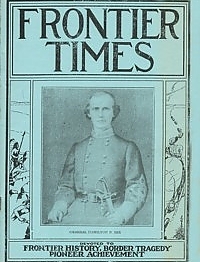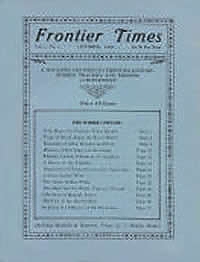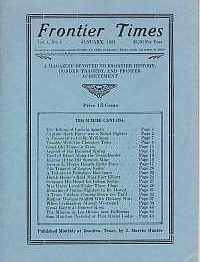By using our website, you agree to the use of cookies as described in our Cookie Policy
Magazines & Instant Downloads
Vol 09 No. 09 - June 1932
General Hamilton P. Bee (On the Cover)
GENERAL HAMILTON P. Bee for many years figured as one of the sterling citizens of Texas. He came of a distinguished family and was himself distinguished. General Bee was born in Charleston, South Carolina, July 21, 1822, and died in San Antonio, Texas October 3, 1897. Long before the Revolutionary War the Bee family, originally English, settled in South Carolina. The great grandfather of General Hamilton Bee was Colonel John Bee, a large rice planter previous to the Revolution. His son Thomas was a member of the Constitutional congress in 1787, and all of the family were staunch patriots. After the formation of the government Thomas Bee was appointed by Washington a judge of the Federal Court, which position he held until his death, February 12, 1812. His wife was a Miss Shubrick, of an ancient Carolina family, of which Commodore Shubrick, of the United States navy, was a member. The father of Hamilton P. Bee was Barnard Elliott Bee, a name well known and highly esteemed in Texas. This is his story.
Further Mentions: General Thomas J. Rusk * the Coletto * Peter Fayssoux, a physician * the Morgan line * J. C. Eldridge * Thomas Torrey * Fort Marlin, * Captain Ben McCulloch * General Mirabeau B. Lamar * General Taylor * Miss Mildred Tarver * John A. Tarver * Forbes Britton and Wallett * Clement Edward * Anne, Carlos and Benjamin * DeBray's, Buchel's and Terrell's * Prussian, Colonel Augustus Buchel * General S. B. Maxey
Jose Antonio Navarro
I. L. Martin, Uvalde, TX.
JOSE ANTONIO NAVARRO was born in San Antonio in 1795. His father, Angel Navarro, was a native of Ajaccio, Corsica, though he was of Spanish ancestry. He came to San Antonio about the year 1785, when Texas was yet a province of Spain, and as all who lived in Texas at that time and claimed to be citizens of the Province regarded themselves as Spaniards, and were subjects of the King of Spain. He regarded himself a Spaniard. Angel Navarro, the father of Jose Antonio Navarro, was the Alcalde of San Antonio for several years previous to the Texas Revolution; he was a man of education and great force of character; and his convictions and opinions were that Texas would eventually separate itself from Coahuila and the Mexican domination, and become an independent State or Republic, and he believed that the support of the Anglo Americans in that direction, and with that object in view, should be encouraged; he, however, died several years before the movement for Texas' independence became evident. This is his story.
Further Mentions: Luciano Navarro, who was the grandfather of the writer of this article * Governor Verimendi * Colonel Ben Milam * Congress of Coahuila * S. A. Maverick, and Francisco Ruiz * William G. Cooke and R. F. Brenham * George W. Kendall * Mr. Kendall * Anson Jones * Gov. Armijo of New Mexico * Edward Dwyer and George Blow * Col. John D. Logan
PRESERVE THE OLD SHRINES
Mentions: the Daughters of the Republic of Texas * Capt. Richard Andrews * Ex-Gov. Neff * David S. Kaufman, David Thomas, Randel Jones, Jno. W. Bunton, Josiah Wilbarger, Joel W. Robinson, Lorenzo de Zavala, Geo. W. Hockley, Wm. J. E. Heard, Henry S. Brown, Capt. Wm. L. Logan, Jno. A. Wharton, W. B. Ochiltree, Robt. M. Coleman, Henry W. Karnes, Thos. Wm. Ward, Rev. Nathan T. Byers, Jno. K. Allen, Benj. B. Goodrich and Mrs. Mary Houston, wife of General Sam Houston.
Hero Of The Big Sandy
By Captain R. G. Carter, U. S. A., Retired.
THE "BIG SANDY" contrary to its name, was a small and narrow stream or branch, a tributary of the West Fork of the Trinity River. In and out, curving and sparkling over smooth sandbars and pebbly reaches, in the warm sunlight, sometimes descending over into a smoothly flowing stream darkly overhung by the huge pecans, slim cottonwoods and smaller hackberrys, it presented in the flickering light of sunshine and shadow, a truly romantic and beautiful picture. But in those early days the savage Indian was abroad. The safety of the settler, the cowboy, the rancher or the Government worker was only secured by the untiring vigilance of the blue coated soldier stationed by the War Department in their midst for this purpose. Along the West Fork and its small tributaries was one of the natural and favorite passways of the Indians. Under the shelter of the timber of the Big Sandy, and through the outskirts of the then small settlements of Denton and Decatur, and along Denton Creek, the blood thirsty Comanche and the wily, thieving, treacherous Kiowa, equally cruel, barbarous and demoniacal in his ingenious and atrocious methods of killing and torture, swarmed in small bands along this line. They were all operating from the Fort Sill reservation.
This story depicts, among other things, a sad story about a brave 15 year old boy who became a hero in the face of a horrible Indian atrocity.
An excerpt: "While away, at the mill one afternoon-nearly a mile away, a small war party of Comanches made their appearance in the neighborhood, just as they have come in now. They were first discovered by a boy, a scout, resolute little fellow, about 15 years of age, who ran to the ranch to give the alarm, shouting as he ran for his mother to bar the door of the room where she was working, while he ran into a detached log room adjoining it, where his father's rifle was. The boy opened fire on the Indians and soon had the satisfaction of seeing several Indians fall by his skillful aim, for he was a dead shot. The Indians were so surprised that they temporarily withdrew, carrying off their dead and wounded. The boy in answer to some cheering messages from his mother through the chinks in the logs, shouted that his ammunition was out. Fatal admission! The Indians heard it. One of their number could understand enough English to interpret his words. They turned and renewed the attack. The gallant boy could not respond. They then rushed upon the house and soon had the unhappy family at their mercy. The mother, boy and infant child were at once dispatched The terror stricken daughter, a girl of about eighteen, was carried off. Such was the condition of affairs when the wretched father returned from his work at night. The Indians were trailed out of their country but were never caught. About two weeks after that, however, the body of the poor girl was found not far from the house, in the timber. She had been scalped and her body had been nearly eaten up, either by peccarys or timber wolves. It was supposed that she could not travel fast enough for the Indians. She resisted and was most cruelly murdered."
"How sad it was to step into the old deserted ranch and see the dark blood stains of that devoted little hero upon the floor and walls; to see the bloody moccasin prints which the savage murderers had tracked about how sad to think of the ill-timed remark of the unfortunate child while so gallantly defending the rude but contented home, and his mother and sisters-to him its precious inmates. Like the defenders of the Alamo; Bonhamn, Travis, and Davy Crockett, this little hero of the Big Sandy should have an enduring monument of stone or bronze erected to his memory."
Further Mentions: Jacksboro * Fort Richardson * Marlatt's ranch * Ball's ranch * Mr. Ball *
No Eulogies For Paine, Whose Pen Helped Beat British
Thomas Paine, the colonial trooper who wrote "The Crisis" with a drum as his desk, had spent the first thirty-seven years of his life in England. A bankrupt corsetmaker, soap box orator, grocer, he showed nothing in his early career except a love for learning and of liberty which would indicate his part in depriving his native land of its choicest colony.
At the lectures on astronomy and philosophy which Paine attended in London he met an American visitor of similar tastes.
"Go to America, Thomas Paine," advised Benjamin Franklin. "It is a new country. One of your capacities can find something there."
"Perhaps I may find a job there as a teacher or a clerk," replied Paine. Franklin gave him a letter of recommendation.
But Tom Paine was destined to be no clerk or schoolmaster. The storm clouds of revolution were gathering when he reached Philidelphia in 1774 and found a job as a magazine editor. It was work he loved and with zest he pounded at the evils of the time, especially slavery, which he loathed with all of his Quaker upbringing.
Further Mentions: Cornwallis * the Hessians at Trenton * the pamphlet "Common Sense * Yorktown * Louis Capet * Lafayette, Condorcet and Mirabeau * Burke's "Reflections Upon the Revolution in France." * "The Rights of Man" * King. Louis went to the guillotine, the reign of terror began and Tom Paine, for daring to oppose the fanatics, was clapped into prison. Almost by a miracle he escaped the guillotine and lived to see the day when the world reviled him. For he was no Christian, but a deist, and boldly aired his views in "The Age of Reason." * Chas. F. Elvers of Arlington *
Old Days In The Old Army
By Lydia Spencer Lane. This very interesting and true narrative by Mrs. Spencer, the wife of an Army officer, is taken from her book, "I Married a Soldier, or Old Days in the Old Army," published in 1892. The book is now out of print. The account truly depicts conditions on the frontier, when the Government established a chain of military posts as a Protection for the early settlers against Indian atrocities.
You will rarely find reading that includes so much minute detail of pioneer and soldier life than in this excellent account. Mrs. Lane was a fine communicator.
Mentions: the Reverend Merwin Johnson, Lieutenant William B. Lane, U. S. Mounted Rifles, and Lydia Spencer, youngest daughter of the late Major George Blaney, U. S. Engineer Corps" * Jefferson Barracks, Missouri * Major and Mrs. Charles Ruff, Mounted Rifles * Dr. J. B. Wright * Lieutenant Ferdinand Paine * Captain (afterwards Major-General) Hancock * Lieutenant Lane * Captain Parmelee * General Sylvester Churchill * Colonel Sidney Burbank, Captain. Rickets, Zenas R. Bliss * Dr. Albert Myer * Fort Inge * Fort McIntosh, Texas * W. L. Elliott and Roger Jones * W. W. Loring, colonel Mounted Rifles * Captain W. L. Elliott * Lieutenant Roger Jones * Colonel Loring * Fort Duncan, on the Rio Grande * R. W. Johnson * Abner Doubleday * Captain and Mrs. McLean * E. V. Sumner, U. S. Army * Ranger, Captain Walker * Captain Thomas Duncan * Colonel George B. Crittenden, Mounted Rifles * Doctor Howard, of San Antonio * Dr. R. N. Lane, my brother-inlaw * Dhanis, a small German settlement * Mr. Finger * Castroville * Madam Tardee * Miss Annie Swisher * Tom Ochiltree * Fort Clark * the Los Moras River * Miss Indiana Maria Jane Walton * Lieutenant Walton * Fort Mclntosh * Captain and Mrs. R. S. Granger * Fort Bliss * Camp Lancaster * Fort Fillmore * Lieutenant and Mrs. John D. Wilkins * Fort Thorn * Old Billy Grier * Fort Craig * Captain Thomas Duncan's company (Continued next month)
Beale's Colony
DR. BEALE, A physician of London, England, but who was living and practicing medicine in Mexico City, and had married a very distinguished lady of that city named Dona Maria Dolores Soto in 1832, with two or three other parties had had secured a permit to settle colonists upon three million acres of land in Texas between the Rio Grande and Nueces Rivers.
Between seventy-five and a hundred people, headed by Dr. Beale, after notable hardships and privations, in March 16, 1834, established on Los Morns Creek, near the present town of Del Rio, and some twelve or fifteen miles from the Rio Grande River, a town which they named in honor of his wife, Dolores. Streets were laid out, the town was platted, and a small church erected, and a temporary wall of brush and sod was built around this embryo city for defense against the Indians.
But the colonists possessed not the hardihood and fortitude necessary to establishment of civilization on a frontier, and Dolores, like Jamestown, soon became an empty manor.
In the month of March, 1836, some eleven men, women and children, amounting in all to the number of seventeen, left Dolores in a vain endeavor to reach the coast by the way of the present San Patricio. Knowing that Santa Ana had invaded the country and war was on between Mexico and the Province of Texas, they avoided all the main traveled routes, hiding at night in the brush and woods from Indians, and on one occasion, while thus hidden in the night, a portion of Santa Ana's army passed near their hiding place.
In April of 1836, while camped near a small lake, the Comanche Indians surrounded and attacked this band, all the men were killed and scalped and the camp destroyed. A Mrs. Horn and her two small sons, a Mrs. Harris and a three month's old baby were captured and carried into the then United States by the Comanches. While on their way out they camped or stopped near Holland Coffee's trading post on Red River, somewhere in the vicinity of the present town of Denison. Holland Coffee tried in vain to ransom these captives, making offers of money, blankets, quilts, robes and whatever might be necessary to effect that purpose, all in vain, the Indians refused to sell or ransom the captives, and it was said this stern old trader sat down and cried at his own helplessness.
Further Mentions: William Donoho, a rich and philanthropic Missourian * Mrs. Plummer * Mrs. Harris * Mrs. Horn * Mr. Nixon, a brother-in-law of Mrs. Plummer * Clarksville *
Going Up The Trail
W. E. Heard.
I was working on a ranch in Nebraska when I received a letter from my brother, W. D., with whom I had left some horses to pasture, telling me to come and get them as they were starving to death. "Bee 'free" and "Turkey Roost" water holes had gone dry, something that had never been heard of before. Well, like all cow boys I was "broke" but I had a private horse so the boys all chipped in and bought my horse, then put him up and played poker to see who would get him, while I bought a ticket to the Sunny South.
Arriving at Sabinal I had just $3.60 left. I bought a coffee pot, a frying pan and few groceries which came to $3.00, leaving me sixty cents. Then we proceeded to round up the horses and in the meantime I related my financial condition to my brothers and they gave me `horse laugh' and told me I was well fixed. One of them said "I want to give you an idea of the financial condition of this country at the present time. I was in Uvalde a few days ago when one of the wealthiest ranchmen in the Frio Canyon walked into his brother's store and asked him for ten dollars. His brother said `I haven't got it, but I will see if I can get it for you" so he went out in town and had to borrow from three different men to get it."
Such is the life of the roaming cowhand in the west… This account goes on to describe further his experiences.
Further Mentions: Leakey * the Hackberry waterhole * the Bell ranch * Paint Creek * old friend John Evant had a sheep ranch * Junction City * Coleman City * Ballinger * Hardeman county * Greer county * the South Canadian River * Montezuma, Kansas * for H. W. and Geo. A. Kennedy
G. W. Kendall, Was First War Correspondent
Account of the first war correspondent, George Wilkins Kendall, a native of New Hampshire, who covered the Mexican war in 1846. This is his story.
Further Mentions: Samuel Morse * Gen. Zachary Taylor and Gen. Mariano Arista * Francis Lumsden * the Picayune * Gen. Maribeau B. Lamar * Amijo * Battles were fought at Cerro Gordo, Jalapa, Puebla and Churubusco * The army included Robert E. Lee, U. S. Grant, George E. Pickett, Rafael Semmes
Panning The Army
By Colonel C. C. Smith, U. S. Army Retired.
CERTAIN WRITERS, because of personal prejudices, or ignorance concerning the army, indulge in panning the service and its officers and soldiers each time they think an opportunity is presented. This prejudice and ignorance causes these gentlemen to make many erroneous and unjust statements, which, if believed by the majority of readers, would make the army a useless and unnecessary organization. But fortunately, the traditions and the history of the service is such as to make real Americans feel proud of the United States army and contempt for its panners. The army is traced to personal spleen on the part of the censurer, because something connected with the service did not meet his views, and for this reason he condemns the whole army, where, perhaps, a very small part is blamable.
Further Mentions: Mr. John P. Clum of Los Angeles * Robt. Gessner * Gen. Stephen Watts Kearny * Mr. Vestal * E. L. Sabin * Lieut. Emory's diary * Captain Moore * Lieutenant Hammond * Lieut Warner of the Topo. Engs * Mr. Robideaux * Miss Cotheal, a sister of Mrs. Major Swords * 2nd Lieut. U. S. Mounted Rifles * Kit Carson * Gov. Bent * Col. Sterling Price * Capt. John H. K. Burgwin * Col-Wm. B. Royall * Capt. Z. M. Pike's * Colonel B. J. D. Erwin * Lieut. F. D. Baldwin * Sergeant Z. T. Woodall * Chas. B. Gatewood
Some names mentioned in this volume:
Jno K. Allen; Capt Richard Andrews; Gen Mariano Arista; Gov Armijo; Austin; Lt F. D. Baldwin; Barker; Dr Beale; Anne E. Bee; Barnard E. Bee; Col Barnard E. Bee; Barnard Elliott Bee; Benjamin E. Bee; Hon Carlos E. Bee; Clement Edward Bee; Forbes Britton Bee; Gen Hamilton P. Bee; ; Col John Bee; Tarver Bee; Thomas Bee; Wallett Bee; Gov Bent; Sen Benton; Birch; George Maj Blaney; Zenas R. Bliss; George Blow; Capt B. L. E. Bonneville; Col Bowie; R. F. Brenham; Henry S. Brown; Col Augustus Buchel; Jno W. Bunton; Col Sidney Burbank; Capt John H. K. Burgwin; Rev Nathan T. Byers; Louis Capet; Carson; Scout; Carter; Gen Sylvester Churchill; Clark; John P. Clum; Holland Coffee; Robt M. Coleman; William G. Cooke; Col George B. Crittenden; Crockett; Dixon; Dobie; J. B. Donoho; William Donoho; Abner Doubleday; Capt Thomas Duncan; Duval; Edward Dwyer; Capt Eldridge; J. C. Eldridge; W. L. Elliott; Capt W. L. ; Chas F. Elvers; Lt Emory; Col B. J. D. Erwin; John Evant; Anne Fayssoux; Peter Fayssoux; Mary Fields; BenjaminFranklin; James L. Freaner; Freemont; Lt Chas B. Gatewood; Robt Gessner; Gillett; Goodnight; Benj B. Goodrich; Capt R. S. Granger; Mrs R. S. Granger; U. S. Grant; Greeley; Dick Green; Billy Grier; Grohman; Lt Hammond; Capt Hancock; W. D. Heard; W. E. Heard; Wm J. E. Heard; Geo W. Hockley; Mary Houston; ; Dr Howard; John C. Ingram; John Gov Ireland; Iscariot; A. N. Jennings; Capt Jinks; Rev Merwin Johnson; Lt R. W. Johnson; Capt Johnston; Randel Jones; Roger Jones; Lt Roger Jones; Henry W. Karnes; David S. Kaufman; Gen Stephen Watts Kearny; G. W. Kendall; George W. Kendall; George Wilkins; Geo A. Kennedy; H. W. Kennedy; Gen Mirabeau B. Lamar; Dr Lane; Lydia Spencer; Dr R. N. Spencer; Lt William B. Spencer; Layland; Lee; Lehmann; Lemley; J. B. Lippincott; Col John D. Logan; Capt Wm L. Logan; Col Loring; W. W. Loring; King Louis; Francis Lumsden; Tom Mahoney; Capt Frederick Marryat; Deputy Marshall; I. L. Martin; S. A. Maverick; Gen S. B. Maxey; Capt Ben McCulloch; Capt McLean; Milam; Miles; Capt Moore; Samuel Morse; Dr Albert Myer; Dr Myer; Myer; Angel Navarro; Anna Navarro; Jose Antonio Navarro; Luciano Navarro; Tom Ochiltree; W. B. Ochiltree; Chief Pa-ha-yu-la; Lt Ferdinand Paine; Tom Paine; John Parker; Capt Parmelee; Parmelee; George E. Pickett; Andres Pico; Capt Z. M. Pike; Col Sterling Price; Rayburn; Capt Rickets; Joel W. Robinson; Rose; Col Wm B. Royall; Maj Charles Ruff; Mrs Charles Ruff; Francisco Ruiz; Rusk; William Howard Sir Russell; E. L. Sabin; Santa; Saunders; Schon; Gen Winfield Scott; Rafael Semmes; Sherman; Shipman; Commodore Shubrick; Smith; Dona Maria Dolores Soto; Sowell; Chief Stone Calf; Col Summer; Gen E. V. Sumner; Margaret Sumner; Annie Swisher; Mrs Major Swords; John A. Tarver; Mildred Tarver; Gen Richard Taylor; David Thomas; Thomas Torrey; Capt Turner; Gov Verimendi; Ursula Verimendi; Stanley Vestal; Capt Walker; Wallace; Indiana Maria Jane Walton; Lt Walton; Thomas M. Ward; Lt Warner; Gen Washington; Jno A. Wharton; Wilbarger; Lt John D. Wilkins; Mrs John D. Wilkins; Sgt Z. T. Woodall; Worth; Gen W. J. ; Dr J. B. Wright; Lorenzo de Zavala; Zarate-Salmeron
$4.95
‹ Back








